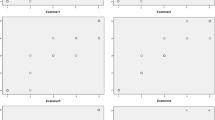Abstract
We examined the social skills of adults with autism, PDDNOS, and mental retardation. All participants were diagnosed with profound mental retardation. Participants in the autism and PDDNOS groups had been previously diagnosed using the Childhood Autism Rating Scale (CARS) and record review. These diagnoses were confirmed by readministering the CARS by one author and an independent rater. Social skills were assessed by using the Vineland Adaptive Behavior Scales and the Matson Evaluation of Social Skills in the Severely Retarded. Significant differences between the autism and mental retardation groups were found on both measures. The PDDNOS group demonstrated better positive nonverbal social skills than the autism group but not the mental retardation group. Special treatment needs of institutionalized adults with autism appear warranted along with a need to clarify further the differences between PDDNOS and mental retardation.
Similar content being viewed by others
REFERENCES
American Psychiatric Association. (1994). Diagnostic and statistical manual of mental disorders (4th ed.). Washington, DC: American Psychiatric Association.
Burt, D. B., Fuller, S. P., & Lewis, K. R. (1991). Competitive employment of adults with autism. Journal of Autism and Developmental Disorders, 21, 237-242.
Cohen, D. J., Paul, R., & Volkmar, F. R. (1986). Issues in the classification of pervasive developmental disorders: Toward DSM-IV. Journal of the American Academy of Child and Adolescent Psychiatry, 25, 213-220.
Dahl, E. K., Cohen, D. J., & Provence, S. (1986). Atypical development: DSM-III and the pervasive developmental disorders of early onset Journal of the American Academy of Child and Adolescent Psychiatry, 26, 170-180.
Elliott, S. N., & Gresham, F. M. (1993). Social skills interventions for children. Behavior Modification, 17, 287-313.
Freeman, B. J., Ritvo, E. R., Yokota, A., Childs, J., & Pollard, J. (1988). WISC-R and Vineland Adaptive Behavior Scales scores in autistic children. Journal of the American Academy of Child and Adolescent Psychiatry, 27, 428-429.
Gillberg, C. (1990). Autism and pervasive developmental disorders. Journal of Child Psychology and Psychiatry, 31, 99-119.
Hobson, R. P. (1986a). The autistic child's appraisal of expressions of emotions. Journal of Child Psychology and Psychiatry, 27, 321-347.
Hobson, R. P. (1986b) The autistic child's appraisal of expressions of emotions: A further Study. Journal of Child Psychology and Psychiatry, 27, 671-680.
Jacobson, J. W., & Ackerman, L. J. (1990). Differences in adaptive functioning among people with autism or mental retardation. Journal of Autism and Developmental Disabilities, 20, 205-219.
Matson, J. L. (1995). Matson Evaluation of Social Skills for Individuals with Severe Retardation. Baton Rouge, LA: Scientific Publisher.
Matson, J. L., LeBlanc, L. A., Weinheimer, B., & Cherry, K. E. (in press). Reliability of the Matson Evaluation of Social Skills in Individuals with Severe Retardation (MESSIER). Behavior Modification.
Mayes, L., Volkmar, F., Hooks, M., & Cicchetti, D. (1993). Differentiating pervasive developmental disorder not otherwise specified from autism and language disorders. Journal of Autism and Developmental Disorders, 23, 79-90.
Mesibov G. B. (1983). Current perspectives and issues in autism and adolescence. In E. Schopler & G. B. Mesibov (Eds.), Autism in adolescents and adults (pp. 37-53). New York: Plenum Press.
Mesibov, G. B. (1984). Social skills training with verbal autistic adolescents and adults: A program model. Journal of Autism and Developmental Disorders, 14, 395-404.
Mesibov, G. B., Schopler, E., Schaffer, B., & Michal, N. (1989). Use of the childhood Autism Rating Scale with autistic adolescents and adults. Journal of the American Academy of Child and Adolescent Psychiatry, 28, 538-541.
Paclawskyj, T. R., Rush, K. R., Matson, J. L., & Cherry, K. E. (1998). Factor structure of the Matson Evaluation of Social Skills for Individuals with Severe Retardation (MESSIER). Manuscript submitted for publication.
Rodrigue, J. R., Morgan, S. M., & Geffken, G. R. (1991). A comparative evaluation of adaptive behavior in children and adolescents with autism, Down syndrome, and normal development. Journal of Autism and Developmental Disorders, 21, 187-196.
Rutter, M. (1978). Diagnosis and definition of childhood autism. Journal of Autism and Childhood Schizophrenia, 8, 139-161.
Rutter, M. (1983). Cognitive deficits in the pathogenesis of autism. Journal of Child Psychology and Psychiatry, 24, 513-531.
Schopler, E., Reichler, R. J., & Renner, B. R. (1988). The Childhood Autism Rating Scale. Los Angeles: Western Psychological Services.
Sparrow, S. S., Balla, D. A., & Cicchetti, D. V. (1984). Vineland Adaptive Behavior Scales. Interview edition, Survey form manual. Circle Pines, MN: American Guidance Service.
Sturmey, P., Matson, J. L., & Sevin, J. A. (1992). Brief Report: Analysis of the internal consistency of three autism scales. Journal of Autism and Developmental Disorders, 22, 321-328.
Van Bourgondien, M. E., & Elgar, S. (1990). The relationship between existing residential services and the needs of autistic adults. Journal of Autism and Developmental Disorders, 20, 299-308.
Volkmar, F. R., Carter, A., Sparrow, S. S., & Cicchetti, D. V. (1993). Quantifying social development in autism. Journal of the American Academy of Child and Adolescent Psychiatry, 32, 627-632.
Volkmar, F. R., Sparrow, S. S., Goudreau, D., Cicchetti, D. V., Paul, R., & Cohen, D. J. (1987). Social deficits in autism: an operational approach using the Vineland Adaptive Behavior Scales. Journal of the American Academy of Child and Adolescent Psychiatry, 26, 156-161.
Wing, L., & Gould, J. (1979). Severe impairments of social interaction and associated abnormalities in children: Epidemiology and classification. Journal of Autism and Developmental Disorders, 9, 11-29.
Author information
Authors and Affiliations
Rights and permissions
About this article
Cite this article
Njardvik, U., Matson, J.L. & Cherry, K.E. A Comparison of Social Skills in Adults with Autistic Disorder, Pervasive Developmental Disorder Not Otherwise Specified, and Mental Retardation. J Autism Dev Disord 29, 287–295 (1999). https://doi.org/10.1023/A:1022107318500
Issue Date:
DOI: https://doi.org/10.1023/A:1022107318500




